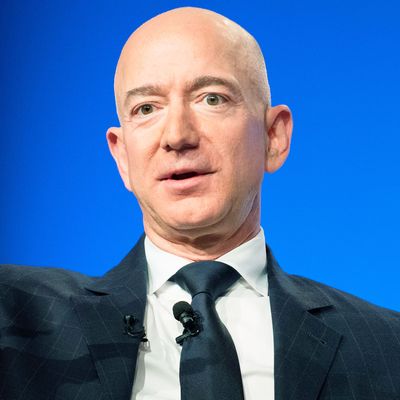
Jeff Bezos once wrote that he expects all of Amazon’s employees “to wake up every morning terrified.” His company’s highly profitable web services business relies on an unregulated, digital labor-market where the median wage is around $2 an hour. In late May of 2011, the temperature inside Amazon’s warehouse in Allentown, Pennsylvania, regularly pushed 100 degrees, and workers started collapsing from the heat. The company responded by stationing ambulances and paramedics just outside the workplace — and sanctioning laborers who insubordinately succumbed to unconsciousness with “disciplinary points.” So many Amazon workers ended up in the local emergency room with heat-related ailments, a physician eventually reported the warehouse to the Occupational Safety and Health Administration.
All of which is to say: Jeff Bezos did not just raise his company’s entry-level wage to $15 an hour out of a long-standing, heartfelt commitment to workers’ rights.
Nor, for that matter, is the Amazon CEO claiming as much. On Tuesday morning, Bezos announced that his firm will pay all of its 350,000 employees $15 an hour for their labors (including part-time, seasonal, and Whole Foods workers), and lobby Congress to raise the minimum wage for all of America’s workers.
“We listened to our critics, thought hard about what we wanted to do, and decided we want to lead,” Bezos wrote in a statement. “We’re excited about this change and encourage our competitors and other large employers to join us.”
Thus, Amazon’s official explanation is, ostensibly, “Bernie Sanders (and our striking workers, and the Whole Foods employees who’ve been trying to unionize, and their allies in the liberal media) made us do it.”
Last month, the Vermont senator introduced the “Bezos Act” — a bill designed to punish corporations that don’t pay their workers a living wage by making them pay a dollar in tax for each and every dollar of food stamps and means-tested health-care benefits that their employees rely on. This was a god-awful proposal in substantive terms. But it now looks like a smashing success in political ones.
That said, it’s a little hard to believe that Sanders bill — and the broader organizing among Amazon workers that inspired it — forced Bezos to make a change that he had no other reason to implement. Amazon has not been paralyzed by any extended, nationwide strikes. Sanders’s bill never had any plausible path to becoming law. The pressure they brought to bear might have been necessary to trigger the wage hike, but it probably wasn’t sufficient.
There’s reason to think labor market conditions influenced Bezos’s calculus. With the unemployment rate sitting below 4 percent, and the holiday season on the horizon, U.S. retailers are in fierce competition for staff. Amazon plans to hire 100,000 seasonal employees — as does UPS, while FedEx is looking for 55,000. Meanwhile, Amazon’s retail competitors have been lifting their starting wages — with Target’s recently rising to $15, Costco’s to $14, and Walmart’s to $11.
Still, it’s unlikely that market conditions required Bezos to establish a $15, nationwide wage floor for every type of Amazon worker. The average wage for retail salespeople in the U.S. is currently $13.20 (which means that a great number of such workers earn far less than that).
Thus, Bezos likely concluded that his company stood to benefit from exploiting its workers a little less than the American labor market would let him get away with. And it’s not hard to see how he might arrive at that view.
The vast scale and scope of Amazon’s business allows it to post razor-thin profit margins — or even lose money — and retain easy access to capital. Most of its competitors do not have that luxury. Therefore, if Amazon can bid up labor costs across the retail and shipping sector, it just might force its competitors to shrink their businesses. Which is to say: The $15 wage hike could be a bid to trade short-term profitability for long-term market-share (which is, after all, Amazon’s entire ethos).
And then, of course, there are publicity benefits.
All this said: Even if his own mercenary interests played bigger a role in Bezos’s decision than his own statement suggests, that doesn’t mean that Amazon’s workers and critics weren’t instrumental in today’s good news. Corporations do not automatically (or even usually) sacrifice short-term profitability to their own enlightened, long-term financial interest. If bidding up wages across the retail sector makes business sense for Amazon today, then it made sense for the company a year ago. In between, the company’s workers and their political allies raised the costs of a low-wage business model. Now, they’ve earned themselves a higher paycheck.






























